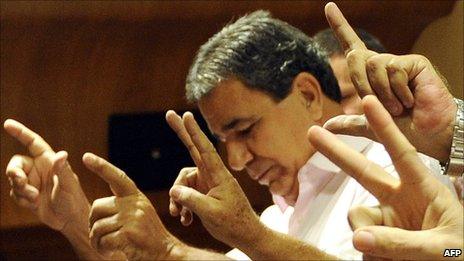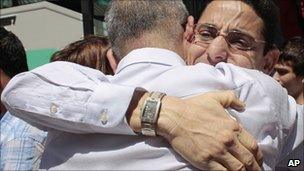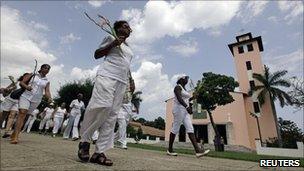Cuba's freed dissidents vow to fight on
- Published

The dissidents told a news conference in Madrid about the conditions in jail
They began by making the "L" sign for liberty and the "V" sign for victory with their fingers.
The six independent journalists from Cuba gathered at a news conference in Madrid were among the first to arrive in Spain this week after being freed by the Havana authorities.
In total, the Cuban government has agreed to release 52 dissidents from prison, in a deal brokered by the Roman Catholic Church.
Cuba might have hoped its move would improve its image abroad after the international outrage when political activist Orlando Zapata died on hunger strike in February.
But here in Spain, the former prisoners have been giving disturbing details of their years behind bars.
"I spent 18 months in solitary confinement," Lester Gonzalez told the BBC, showing a court paper which detailed his 20-year prison sentence.
"[I was] in the dark, with my hands tied; with rats and cockroaches and excrement everywhere. That was all I could smell."
The men were among 75 arrested in a 2003 round-up of Cuban dissidents, known as the Black Spring.
Now in Spain, which offered to receive them after their release, they've described crowded and filthy prison cells where they were denied drinking water for days; often, the only food was "giraffe soup" - so watery, the prisoner stretched his neck searching for some kind of nutritional content.
"I went into prison weighing 86kg, now I'm 48kg," said Jose Luis Garcia Paneque, one of several men now suffering serious medical complaints.
"That's the effect of my prison time: chronic illness for rest of my life," explained Mr Garcia Paneque, now a shrunken figure with hollow cheeks.
Cuba has always denied that it has political prisoners, describing them as criminals paid by the US to destabilise the country.
The men, who were held with ordinary Cuban criminals, recounted how prisoners routinely inflicted serious injuries upon themselves to get even basic medical attention from prison staff.
In one case, they said a man jabbed needles in his eyes but was left unattended for two days.
Confinement
News that Church officials had secured dozens of political prisoners' release came on 7 July.

It has been an emotional few days for the freed dissidents
The first men chosen were instructed to make a list of family members. Days later, they were whisked from their cells straight on to a plane and into exile.
The men were issued new Cuban passports at the airport; here in Spain, they have been given residency, with the right to live and work where they choose. But to the formers prisoners it still feels like a form of confinement.
"The Cuban government has been categorical: we have to get permission to return to the place we were born in," said Julio Cesar Galvez, who describes his arrival in Spain as deportation.
"We are not free. We are not immigrants here. Quite simply, we are refugees."
Cuban Church officials say 20 prisoners have agreed to come to Spain. As their criminal convictions have not been overturned, they say exile was the only option.
"If I leave prison, but I can't work to support my family, that's not freedom," explained Mr Galvez, who was sentenced to 15 years for his work as an independent journalist.
"If I'm still harassed, if they follow us, listen to our phone calls and want to know where we're going and what we're doing - we're not free," he said.
'Smoke-screen'
Spain hailed the decision to release the men as the start of a new era in Cuba.
Foreign Minister Miguel Angel Moratinos, who was in Cuba at the time, called on the EU to soften its stance and "normalise" relations with Cuba in response.
He made the same appeal when Spain held the EU presidency in the first half of 2010, but Orlando Zapata's death was a powerful counter-argument.

The Ladies in White group in Cuba has vowed to keep calling for all dissidents to be freed
Now, the former prisoners say it would be "unacceptable" to see their release as proof that the Cuban government's approach to human rights has improved.
"Real improvement would mean new laws, no more repression or arrests of human rights activists," one said, adding that included his own right to return home without fear of prison again.
Another mentioned freedom of speech, and a third called the government's move a "smoke-screen" ahead of an EU review of its common position on Cuba this autumn.
That will make uncomfortable listening for the Spanish government.
The Spanish Red Cross and refugee agency (CEAR) are helping the men with accommodation, legal aid and finding work.
They will move to refugee centres outside Madrid soon, where they can start planning for the future.
For some, there has already been an emotional reunion with relatives. One man had not seen his mother in seven years; all say their imprisonment was as harsh a punishment for their families, as for them.
So as they adjust to life outside prison - and together again - the men have vowed to go on fighting for the freedom of all political prisoners in Cuba, from here in exile.
- Published7 July 2010
- Published13 July 2010
- Published9 July 2010
- Published8 July 2010
- Published19 March 2012